Super User
ANDRITZ to supply stock preparation system to Vinda Personal Care, China
International technology Group ANDRITZ has received an order from Vinda Personal Care (Guangdong) Co., Ltd. to supply a stock preparation system to feed its four tissue machines at the mill in Yangjiang, Guangdong, China. Start-up is scheduled for the second to third quarter of 2021.
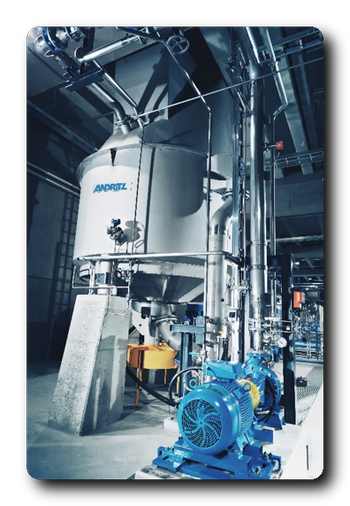 FibreSolve FSV pulper as part of the LC pulping system Photo: AndritzThe new system will have a capacity of 200 bdmt/d and will process a mixture of NBKP (Needle Bleached Kraft Pulp), LBKP (Leaf Bleached Kraft Pulp) and bagasse as raw material. ANDRITZ will install the complete system, with equipment for low-consistency (LC) pulping, high-consistency (HC) refining, approach system and broke handling.
FibreSolve FSV pulper as part of the LC pulping system Photo: AndritzThe new system will have a capacity of 200 bdmt/d and will process a mixture of NBKP (Needle Bleached Kraft Pulp), LBKP (Leaf Bleached Kraft Pulp) and bagasse as raw material. ANDRITZ will install the complete system, with equipment for low-consistency (LC) pulping, high-consistency (HC) refining, approach system and broke handling.
The LC pulping system comprises a FibreSolve FSV pulper and a high-density (HD) cleaning system for optimum slushing of the raw material. In order to achieve optimum processing of the mixture of annual and short fibers, the customer opted for a 120 bdmt/d HC refining system for the tissue production line. The combination of an ANDRITZ Pulp Screw Press and an HC refiner, type CDIPL, will enable superior fiber properties at low energy consumption.
The outstanding cooperation between the two companies started over 17 years ago, and ANDRITZ has since then supplied over 20 stock preparation systems to the Vinda Group. The successful business cooperation as well as the excellent performance of recently installed technologies were the decisive criteria that persuaded the customer to trust in ANDRITZ once again.
Vinda Personal Care (Guangdong) Co., Ltd., part of the Vinda Group, is one of the top four tissue producers in China. The Vinda Group provides high-quality hygiene products and services, and operates four core business segments with the key brands Vinda, Tempo, Tork, TENA, Dr. P, Libresse, VIA, Libero and Drypers.
Valmet to supply pulp production upgrade technology to PT. Tanjungenim Lestari Pulp and Paper in Indonesia
Valmet will supply pulp production upgrade technology to PT. Tanjungenim Lestari Pulp and Paper (PT TEL) in Indonesia. The delivery includes an upgrade of continuous cooking system, with a design capacity of 1,800 air dried tonnes per day, and two sets of new automatic baling equipment. With the new investments, PT TEL targets to increase its pulp production capability and improve its pulp quality.
The order is included in Valmet's orders received of the second quarter 2020. The value of the order will not be disclosed. An order with this scope of supply and delivery is usually valued in the range of EUR 10-12 million.
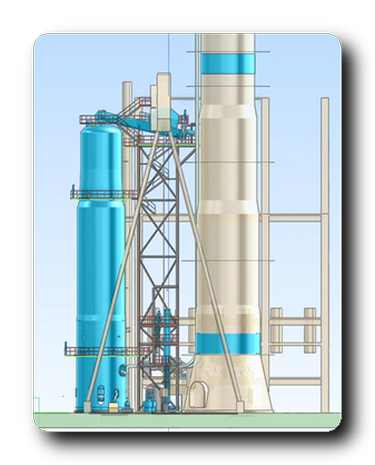 A new Valmet ImpBin will be installed prior to the existing digester vessel, which will be upgraded with Continuous Cooking G3 features.“Our target in the cooking system upgrade is to reduce our unit wood consumption by increasing the pulp yield and reducing reject content, to enhance our pulp quality and to lower the specific load on the recovery boiler. By upgrading to Valmet’s latest continuous cooking system we will significantly increase the pulp yield which will reduce our operating costs and allow us to be capable to increase the overall mill pulp production. Moreover, with the two new sets of baling equipment, we aim at improving availability and production stability. We have logically selected the advanced and reliable technology that supports us in achieving our target in this project,” says Hiroyuki Moriyasu, President Director, PT TEL.
A new Valmet ImpBin will be installed prior to the existing digester vessel, which will be upgraded with Continuous Cooking G3 features.“Our target in the cooking system upgrade is to reduce our unit wood consumption by increasing the pulp yield and reducing reject content, to enhance our pulp quality and to lower the specific load on the recovery boiler. By upgrading to Valmet’s latest continuous cooking system we will significantly increase the pulp yield which will reduce our operating costs and allow us to be capable to increase the overall mill pulp production. Moreover, with the two new sets of baling equipment, we aim at improving availability and production stability. We have logically selected the advanced and reliable technology that supports us in achieving our target in this project,” says Hiroyuki Moriyasu, President Director, PT TEL.
“Valmet’s continuous cooking technology fits the customer’s requirement of cost-efficient pulp production with high pulp yield and low reject content, while also ensuring excellent pulp quality. Furthermore, this repeat order of baling machines shows that customer trusts our technology and our previous delivery of three baling machines in 2019 have met the customer’s expectation. We are happy to continue the cooperation with PT TEL,” says Fredrik Wilgotson, Vice President, Pulp and Energy, Asia Pacific, Valmet.
Information about the delivery
This upgrade project will add the Valmet Continuous Cooking G3 technology to PT TEL’s existing cooking system. A new Valmet ImpBin will be installed prior to the existing digester vessel, which will be upgraded with Continuous Cooking G3 features. ImpBin ensures homogeneous chip steaming and impregnation, which is the key to produce high quality pulp with high pulp yield and low reject content. The upgrade also includes Valmet’s latest technology for chip pumping. The start-up is scheduled for the fourth quarter of 2021.
In addition, the delivery includes a modern Valmet Wire Tyer, which is operated by electrical servo motors, resulting in exact and gentle wire feeding. The Valmet Wire Tyer ensures a reliable system for bale wire application that can process up to 300 bales in an hour. The new baling equipment is scheduled to be delivered in late 2020 and the startup is planned for the first quarter of 2021.
Information about PT. Tanjungenim Lestari Pulp and Paper
PT. Tanjungenim Lestari Pulp and Paper (PT TEL), a subsidiary of Marubeni Corporation, produces high-quality, bleached-hardwood kraft pulp with 100 percent plantation grown Eucalyptus Pellita and Acacia mangium trees.
Mondi Syktyvkar commissions a new crude tall oil plant
Mondi, global leader in packaging and paper, has commissioned a crude tall oil plant (CTO-plant) at its Syktyvkar pulp and paper mill. The new equipment allows processing of all sulphate soap generated as a by-product of the pulp production process in the mill. As a result of this investment, the mill will be able to produce up to around 40,000 tonnes of crude tall oil annually.
- New plant will help to manage the increased production capacity of Mondi´s Syktyvkar mill
- Project will produce around 40,000 tonnes of crude tall oil annually with a focus to be sold to the petrochemical, road construction, paint and coating sector
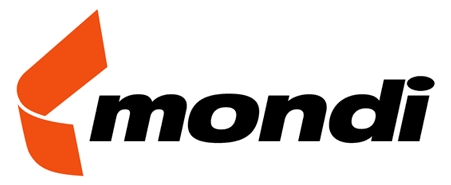 The new CTO-plant produces softwood and hardwood tall oil obtained through sulphuric acid treatment of sulphate soap which is a by-product of the pulp cooking process. Softwood tall oil is used at Mondi Syktyvkar to mitigate pitch deposits at the digesters, while hardwood tall oil is sold to external companies dealing in petrochemical, road construction, paint and coating. In recent years, tall oil has been intensively used for biodiesel fuel production primarily in Scandinavian countries.
The new CTO-plant produces softwood and hardwood tall oil obtained through sulphuric acid treatment of sulphate soap which is a by-product of the pulp cooking process. Softwood tall oil is used at Mondi Syktyvkar to mitigate pitch deposits at the digesters, while hardwood tall oil is sold to external companies dealing in petrochemical, road construction, paint and coating. In recent years, tall oil has been intensively used for biodiesel fuel production primarily in Scandinavian countries.
The state-of-the-art equipment allows for automation and online control of almost all parameters of the process and makes it possible to perform continuous production of tall oil.
“The CTO-plant was built as part of the Horizon strategic investment programme aiming at eliminating bottlenecks in pulp and paper production processes, as well as responding to the mill’s increased production capacity. Processing of by-products of the pulp production process has become one of the outcomes of the roadmap as the old plant could no longer manage growing pulp production volumes“, said Klaus Peller, Managing Director of Mondi Syktyvkar.
To properly maintain the new CTO-plant the staff have undergone specialist training. To further leverage the production potential of the new CTO-plant, additional equipment will be commissioned including a 600 m3 sulphate soap storage tank, a dispatch unit with a new bridge to load oil into rail tank cars and tank trucks as well as an additional storage tank to ensure the necessary stock of tall oil. Works for these projects are scheduled to be completed by the end of 2020.
NSK TL bearings double service life in papermaking machinery
NSK spherical roller bearings with TL technology are being increasingly adopted in the papermaking industry as more machinery manufacturers and paper mills seek to maximise operating life and uptime. The unique attributes of NSK´s TL (tough and long life) specification is proven to provide greater resistance to hoop stress, subsequently reducing inner ring fractures and delivering service life more than twice that of conventional bearings with standard heat treatment. TL series spherical roller bearings are specifically designed for sections of papermaking machinery where elevated temperatures prevail, including dryer rolls, calender rolls, canvas rolls and PV rolls. The bearings were developed as a solution to a specific problem: inner ring fractures. This problem is common on dryer cylinders (including Yankee dryer rolls) and calender rolls, where steam is passed through the hollow axis of the roll to heat it. Here, the journal expands faster than the bearing, making the fit tighter. As the hoop stress (force exerted circumferentially) of the inner ring increases, cracks can begin to appear.
High temperatures in papermaking machinery also present further challenges to bearings. For instance, the presence of heat lowers the viscosity of lubricant, reducing bearing life, while unwanted creep can have a negative impact on dimensional stability.
Although adopting a slow start-up procedure can prevent such problems - by introducing temperature gradually - it can take several hours and paper mills cannot afford the lost production and revenue. Instead, the solution lies in astute bearing selection.
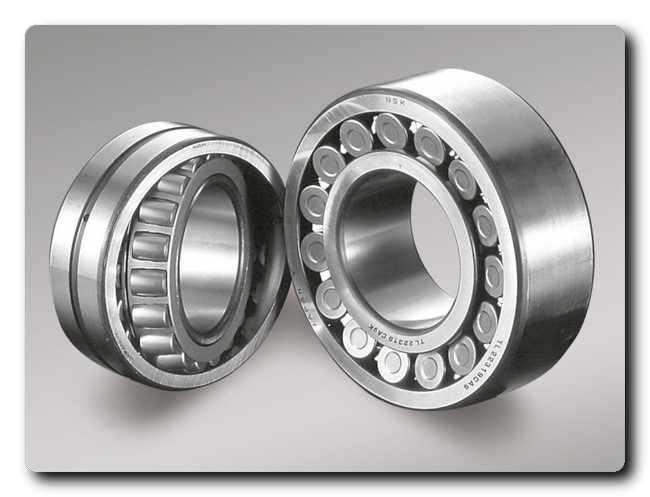 Many sections of papermaking machinery are subject to high temperatures which present specific challenges to bearings. Photo: Moreno Soppelsa/Shutterstock
Many sections of papermaking machinery are subject to high temperatures which present specific challenges to bearings. Photo: Moreno Soppelsa/Shutterstock
To counter the effects of temperature, NSK analysed the mechanism of inner ring fracture and established a strength evaluation method that subsequently led to the development of the proprietary TL specification. The type of steel used in these bearings is case-carburised using a special method of heat treatment that attains both high raceway surface hardness and dimensional stability under high temperatures. Importantly, the strength of the inner ring is increased sufficiently to better resist hoop stress, even at temperatures up to 200°C.
The resistance of inner rings that meet the TL specification is higher than the resistance of inner rings made from bainitic steel or bearing steel, while the surface hardness of the rolling surface is greater than the hardness of rolling surfaces made from bainitic steel or case-hardened steel. These factors underpin the ability of TL bearings to provide longer service life when used on calenders, guide rolls and smoothing rolls, for example.
A case in point involves a major paper mill that was experiencing problems with its calender rolls, where multiple cracks were developing on the inner rings of the roll bearings. Frustrated by up to 12 failures annually, which led to excessive downtime and maintenance, the mill invited NSK´s team of expert engineers to investigate and resolve the issue. As part of NSK´s Added Value Programme AIP, a comprehensive application review was commenced.
The NSK specialists soon discovered that the standard spherical bearings being used in the calender roll did not feature carburised inner rings, leaving them susceptible to the high heat of the application, and cracking of the inner rings. It was therefore recommended that the paper mill switch to NSK spherical roller bearings with TL technology. The innovative chemical steel composition and greater resistance to hoop stress and cracks, doubled operating life and reduced the cost of replacement bearings and downtime. Over a five-year period since the change was made, the paper mill has saved around €430,000.
NSK spherical roller bearings with TL technology have been in operation on dryer cylinders and other papermaking machinery rolls since 1994, with no problems reported. Today, over 100 different TL bearing sizes/types are produced, helping a wide range of customers achieve better and more cost-effective performance. In addition, to accommodate bearings for Yankee dryer rolls, NSK can offer large TL series self-aligning roller bearings with diameters up to 1,360 mm.
Valmet’s comment on Alfa Laval’s tender offer for Neles’ shareholders
Valmet has become aware of Alfa Laval’s announcement on public cash tender offer for all shares in Neles. Valmet completed 14.88 percent share acquisition of Neles’ shares from Solidium Oy on July 1, 2020.
 “Neles is a good quality company with a strong position in the pulp and paper industry and other process industries. Valmet and Neles have a common heritage, serve similar global industries and benefit from same global megatrends. Valmet sees a good amount of value in Neles and with the previously announced share acquisition our target is to participate in developing the company further. Therefore, as a Neles shareholder, Valmet does not consider Alfa Laval’s tender offer to be beneficial for Neles. Valmet will continue as an active shareholder of Neles,” says Pasi Laine, President and CEO of Valmet.
“Neles is a good quality company with a strong position in the pulp and paper industry and other process industries. Valmet and Neles have a common heritage, serve similar global industries and benefit from same global megatrends. Valmet sees a good amount of value in Neles and with the previously announced share acquisition our target is to participate in developing the company further. Therefore, as a Neles shareholder, Valmet does not consider Alfa Laval’s tender offer to be beneficial for Neles. Valmet will continue as an active shareholder of Neles,” says Pasi Laine, President and CEO of Valmet.
Valmet acquires 14.9% ownership in the future Neles
Valmet completes 14.9% ownership acquisition of Neles
‘Let’s Talk Tissue’— A Panel Discussion About the Tissue Industry’s Challenges and Opportunities in the Age of COVID-19
Just a few short months ago at the start of the COVID-19 pandemic in the United States, news reports were filled with scenes of pandemonium at supermarkets and shelves emptied of cleaning supplies and — most critically — bathroom tissue. Tales of selfish tissue hoarders and desperate tissue searchers for that formerly bountiful commodity were daily media fodder.
The pandemic crisis placed enormous pressure on the tissue supply chain. But the sector proved to be remarkably resilient, and the pandemic has actually accelerated the pace of change within the industry. To assess the lasting impact of COVID-19 on the tissue business, Tissue World magazine hosted an online panel discussion June 23 with four industry experts.
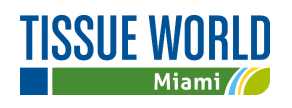 Moderated by Jonathan Roberts, conference chair and content advisor for Tissue World, the panel included Kim Underhill, group president of Kimberly-Clark North America; Brian Allen director of cyber advisory services for EY, USA; Udaiyan Jatar, founder of Blue Earth Network, USA; and Ivo Kool, senior product development manager, tissue, paper, nonwovens for Sam’s Club, USA.
Moderated by Jonathan Roberts, conference chair and content advisor for Tissue World, the panel included Kim Underhill, group president of Kimberly-Clark North America; Brian Allen director of cyber advisory services for EY, USA; Udaiyan Jatar, founder of Blue Earth Network, USA; and Ivo Kool, senior product development manager, tissue, paper, nonwovens for Sam’s Club, USA.
The discussion has been edited for length and clarity.
Roberts began the session by noting the panelists all came from North American companies. “That’s not a coincidence,” he noted, “As this event was born out of Tissue World Miami, which was postponed from March and is due to take place in November of this year.”
Roberts then posed his first broad question: “How is the tissue business responding in this extraordinary time?”
Kimberly-Clark’s Underhill noted three areas that have been challenging and required significant leadership: “One being, first and foremost, the safety and well-being of our people and keeping our mills running. We quickly moved into implementing safety protocols — masks, social distancing, temperature checks and the like. A lot of factories had to shut down, but our goal was to keep it running.
“The second challenge was the unprecedented demand,” said Underhill. “There are lots of theories about this hoarding of bathroom tissue, and why bath tissue and towels versus other categories. The clearest explanation was that people felt like they needed a little sense of control. All of a sudden something we take for granted in North America became something you could not imagine life without.
“The demand escalated very fast and the challenge became we were just out of stock, and it wasn’t just Kimberly-Clark, the industry was challenged because of the increase in demand, and we still see that, particularly in the U.S.
“The last challenge was how can we work with our retail partners to fix the supply chain. We realized there were parts of the supply chain we had to rework because it had never seen such extreme and quick consumer demand, which opened up a lot of challenges but also a lot of opportunities in thinking about our supply chain going forward.”
“From the beginning of March to the end of April I’d say purchases almost doubled and then slowly went down to about half,” said Kool of Sam’s Club. “It was quite amazing. A couple of trucks would arrive, we’d unload them, and the product would be gone within an hour or two because people would get on the phone and say, ‘Hey, it’s in town!’ And off everyone would go and buy it.
“But I really have to say for our private brand business, our vendors supported us unbelievably well,” Kool continued. “I mean, everyone pulled out all stops.”
Roberts asked Jatar of Blue Earth Network how industries beyond tissue responded to the pandemic.
“The big companies did a really good job, the best processes I’ve seen,” said Jatar. “They’ve done a really good job about keeping communication going, building public trust and managing personal health and business health. Trust-building and empathy are pretty important.
“The second thing is while I know we are talking about COVID, we have to consider what happened with the Black Lives Matter movement that highlighted the big gaps between the haves and the have nots,” he said. “Companies are recognizing that words are not enough, and there’s a greater tendency to take action now more than ever before.”
“The best organizations are really taking action, supporting their employees, whether it’s with childcare, flexibility in hours or developing diverse talent,” Jatar noted. “And there are opportunities for companies to say we want to be the most diverse and have the best talent and extending their support to Black people.
“And lastly, there’s a push to develop innovation — especially among smaller companies,” he said. “They are innovating product and the supply chain. They are looking through the lens of the future, when people are going to expect more transparency in the supply chain, more justice in the supply chain, when they are going to expect new technologies that address health and sanitation. These companies are innovating from the ground up rather than just fixing legacy systems.”
Roberts asked Allen of EY what kinds of security issues companies and employees were facing during this new period of working remotely.
“We’ve definitely seen a ballooning of threats,” said Allen. “Which is fairly typical when criminals see a fresh opportunity. And it’s coming from organized crime and different state actors. We are all working in a different environment and the biggest weaknesses we’re seeing is employees not being aware of threats.
“One, we have to recognize we are working in a different environment,” Allen continued. “Two, the actors are very sophisticated. They are getting very good at their game. We’re seeing very complicated phishing scams that are exploiting different vulnerabilities — they are selling personal protective equipment, they are offering advice from WHO and doctors, they are exploiting e-commerce.
“Security firms are keeping executives better informed about these risks so they can find the right balance between risk and reward, and can better maneuver in this new environment,” he noted. “But that information about risks needs to be more timely and more in-depth.”
The discussion moved on to the positive lessons learned from the coronavirus crisis.
“There has been an awakening of an awareness of the systemic failures of our economy and our society that were inherent before the COVID crisis,” said Jatar. “A crisis tends to shine a spotlight on your weakest connection, and one of them has been short-termism in the management of culture and gender across all kinds of organizations. There’s been an awakening of appreciation for workers that we didn’t see before.
“And there’s a greater appreciation of the changes that come about by remote working, from improved communications to greater sustainability in work surroundings and a greater appreciation for our human ability to connect online and collaborate,” he said. “Organizations are taking advantage of social distancing and remote working to develop bigger and better ideas and better processes through online collaboration.”
“This crisis has been a gift that has given us an opportunity to accelerate some changes we have wanted to do for a very long time,” said Underhill. “Internally, in the tissue business, SKU management is very important, and one of the things we learned that will be a lasting impact is SKU simplification. In some of our businesses we have cut SKUs by over 70% and that has enabled us to get 15% to 20% improvement in capacity.
“Because the demand was so high, we had no choice but to make some difficult choices,” she said. “And we found that those choices weren’t so bad after all. I see that as sort of a mind-set shift going forward.
“I don’t think any of us would have said we could hold our business together while working from home for over three months,” said Underhill. “But we have. It’s changed the way we connect. I’ve heard people talking about how we’re more engaged, more accessible.”
Roberts asked what transformations we might see in the wake of COVID-19 in terms of consumer behavior, trends and business operations.
“I think we’ll see a more holistic approach,” said Allen. “Rather than looking at risk management as different silos, such as crisis management, information security or business security, we’re seeing a lot of alignment in risk practice to be more coordinated as we move through digitalization.
“One, there’s tremendous overlap in these practices,” he continued. “Two, there are great benefits in getting consistent and timely reporting. And three, we’re really starting to see that these risk assessments need to go deeper into the organization, and some of that is being driven by digitalization. And the demand and speed of digitalization is so significant that the risk practice, whether that’s cyber or IT risk, needs to be provided to business leaders throughout the organization so they can continuously make informed risk-based decisions.”
Roberts: “What changes in consumer behavior are likely to be most impactful and most enduring in the wake of the crisis?”
“We talk a lot about B2C, business-to-consumer, but I think now we are lot more C2B, consumer-to-business, with consumers telling us through their online behaviors and research what values matter to them,” said Jatar. “In this demonetized world, companies have to offer something more than product features and attributes to distinguish themselves. They need to come up with an X-factor that transcends their competitors.
“I’m seeing companies recognizing that consumers and society at large want a lot more out of business than just business,” he said. “They expect businesses to be a part of the community. Organizations that are taking the lead and engaging with Black Lives Matter are also businesses that are creating more equitable feelings for their employees and their customers. There are a couple of value areas where I’m seeing organizations really starting to build a relationship with the B2C and C2B interconnection to really differentiate themselves. But they need to translate those values into action. I think transparency is going to be the big trend going forward because in the digital world there is no place to hide. The companies that take the lead in transparency and build trust will get ahead of their competitors.”
Roberts: “What role does tissue play in a positive human future?”
“All of us are going to become more conscientious, aware and concerned about cleaning and germ control, whether that’s on your person, your automobile, your home or your office,” said Underhill. “I think this is a great opportunity for the tissue world to not only think about our products today, but where we can invent and create innovations that can actually protect at a greater level of confidence.
“I suspect that innovation is going to allow all of us to really gain confidence in protecting ourselves, our family and our environments more than ever before,” she said. “Companies that can invent in this space and create a point of differentiation with real tangible, clinical evidence that you can prevent germs, I think that’s going to be a significant opportunity for the tissue industry.”
Roberts then asked about attracting talent — is that going to be different and is it going to be a bigger challenge in the future?
“The positive thing is rethinking the way we work for the next generation,” said Underhill. “The next generation wants more flexibility, they want to work when they want and where they want, and I believe the former emphasis on visibility in the office, hours in the office — that’s completely reframed by this whole experience, and that’s not important anymore.
“We’re much more focused on the outcomes and how people are working,” she continued. “I’m very excited to see how we carry this forward, and I’m just going to say we’re not going back. We will definitely have much more flexible arrangements for our employee base, particularly our staff operations, in the future. We just have to figure out how to do it. We don’t have the answers yet, but we are definitely not going back to where we were on March 12.”
Tissue World 2020 is currently scheduled for Nov. 11-13, 2020, at the Miami Beach Convention Center.
Registration for North America’s largest gathering of the global tissue trade is still open and can be accessed at https://www.tissueworld.com/miami/en-us. Tissue World attendees typically include suppliers to the tissue industry, tissue converters, integrated tissue product makers, jumbo roll suppliers and retailers and distributors.
ANDRITZ successfully starts up OCC line at Wamat Paper, China
International technology Group ANDRITZ has successfully started up the first of two OCC lines, each with a capacity of 1,000 bdtm/d, supplied to Shandong Wamat Paper Co., Ltd., Shandong Province, China. Start-up of the second OCC line is scheduled for the end of this year. Both lines produce pulp for corrugated medium as the final product.
The ANDRITZ scope comprises the entire equipment from pulping to headbox screening and includes a saveall disc filter for fiber recovery.
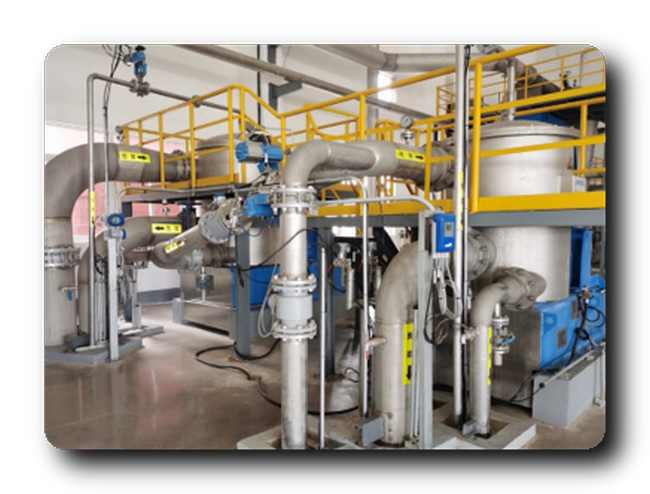 ANDRITZ screening for superior stock quality Photo: ANDRITZ
ANDRITZ screening for superior stock quality Photo: ANDRITZ
The equipment and technologies supplied by ANDRITZ enable excellent stock quality and yield significant savings in energy consumption. The lines feature the following technological highlights:
- Low-consistency (LC) pulping system, including a FibreSolve FSR pulper with flow-optimized rotor and vat for low power consumption, as well as a FibreGuard detrashing system with a FibreWash Drum in order to remove non-disintegrated rejects early in the process.
- Special coarse screening set-up combined with cleaners for light and heavy reject removal to provide superior stock quality and reliable separation of styrene foam. Fine screens and fractionators are equipped with innovative PrimeRotors to ensure highly efficient reduction of stickies and debris.
- The complete system is characterized by a special concept using a smaller number of pumps, resulting in significant reductions in energy consumption.
Mr. Zhang Yanjun, General Manager, Wamat Paper recalls: “Despite several difficulties relating to accommodation and transport as well as strictest health and safety precautions in view of the COVID-19 pandemic, ANDRITZ provided excellent start-up support and was first on site after the government permitted people from other provinces to enter our region again.”
Wamat Paper and ANDRITZ (China) Ltd. have once more demonstrated their excellent cooperation and completed this successful start-up even in the most challenging crisis situation.
Shandong Wamat Paper was established in 2017 and is a subsidiary of the Shandong Century Sunshine Paper Group Co., Ltd. – an important player in the Chinese but also the global papermaking industry.
Solenis Completes Acquisition of Poliquímicos, S.A. de C.V.
Effective since the July 14, 2020, Solenis LLC (“Solenis”) completed the acquisition of 100% of the outstanding shares of Poliquímicos, S.A. de C.V. (“Poliquímicos”).
 Headquartered in Mexico City, Mexico, Poliquímicos is a leading producer and supplier of specialized chemical solutions for water-intensive industries, including the pulp and paper markets in Mexico. The business will be integrated into Solenis as part of its direct-to-market strategy.
Headquartered in Mexico City, Mexico, Poliquímicos is a leading producer and supplier of specialized chemical solutions for water-intensive industries, including the pulp and paper markets in Mexico. The business will be integrated into Solenis as part of its direct-to-market strategy.
“The acquisition of Poliquímicos will enhance Solenis’ direct sales channel in the Mexican market and improve our production capabilities in the region,” said John Panichella, CEO, Solenis. “With more than 46 years of history in Mexico, we are thrilled to welcome the Poliquímicos team and are excited to provide them with the full suite of Solenis products to better serve our customers.”
“The strategic location of the Poliquímicos production facility, a strong position in the packaging market, along with a talented commercial team, provides Solenis the opportunity to better serve the Mexican market,” said José Armando Piñón Aguirre, vice president, Latin America, Solenis. “We will integrate the Poliquímicos’ business into Solenis during the next few months to ensure a seamless transition for customers in Mexico.”
ANDRITZ PrimeLineTM W6 tissue machine at Arkhbum Tissue Group in Russia delivers top quality
Only a few weeks after start-up, the 5.6 m wide PrimeLineTM W6 tissue machine that was delivered by ANDRITZ to Arkhbum Tissue Group LLC in Vorsino (Kaluga region), Russia, reached a speed of 2,000 m/min with a grammage of 16 g/m² and is now producing high-quality facial, toilet, napkin, and kitchen towel grades made of 100% virgin pulp (bleached hardwood and softwood pulp).
Irina Galakhova, Chairman of the Board of Directors, Arkhbum Tissue Group LLC, says: “We are extremely satisfied with our products – and so are our customers. We appreciate the high quality and softness. In addition, we achieve remarkable cost savings compared to systems with conventional presses and Yankees.”
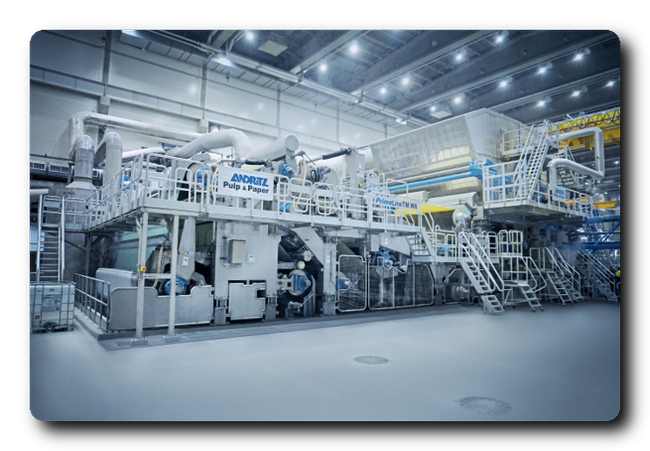 Successful operation of the ANDRITZ PrimeLineTM W6 tissue machine with the latest PrimePress XT Evo shoe press technology at Arkhbum Tissue Group LLC in Russia Photo: ANDRITZ
Successful operation of the ANDRITZ PrimeLineTM W6 tissue machine with the latest PrimePress XT Evo shoe press technology at Arkhbum Tissue Group LLC in Russia Photo: ANDRITZ
The ANDRITZ tissue production line features a Papillon refiner in the stock preparation plant to achieve superior fiber properties at low energy consumption. The tissue machine’s steel Yankee and ANDRITZ’s latest shoe press technology enable a high drying capacity and operating flexibility. The re-evaporation system installed brings energy back into the production process, thus enabling additional savings.
ANDRITZ delivered the PrimeLineTM W6 tissue machine together with the stock preparation and approach flow system, heat recovery re-evaporation system, hall ventilation and heating, automation, and electrification.
This successful project once again confirms ANDRITZ’s strong position as one of the global market leaders for supply of complete, resource-saving, tissue production lines, key components, and services.
Successful FSC® and PEFC™ monitoring audit
Mitsubishi HiTec Paper has successfully passed without exception the monitoring audit and the re-certification of FSC® Chain-of-Custody and PEFC™ Chain-of-Custody.
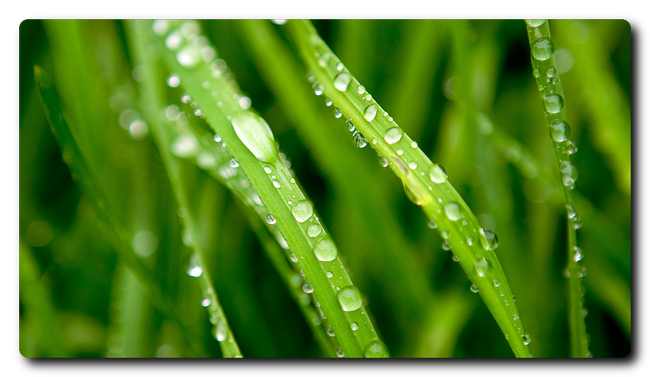 Mitsubishi HiTec Paper: Successful FSC® and PEFC™ monitoring audit
Mitsubishi HiTec Paper: Successful FSC® and PEFC™ monitoring audit
Mitsubishi HiTec Paper attaches great importance to the environmentally conscious and sustainable production of its coated specialty papers. This has now been reaffirmed by the successful FSC® monitoring audit and the PEFC™ re-certification of the mills in Bielefeld and Flensburg. Both locations continue to carry the FSC® Chain-of- Custody and PEFC™ Chain-of-Custody certifications, and all coated specialty papers produced in Bielefeld and Flensburg are still available FSC® Mix or PEFC™ certified.
“The world is facing major climatic and social challenges. It is therefore all the more important for us to ensure that the raw materials we use and our products meet the highest standards in terms of sustainability and social responsibility,” says Nic Holmer, Director Sales & Marketing at Mitsubishi HiTec Paper. “When it comes to sustainability, our BARRICOTE® barrier papers for flexible food packaging are particularly relevant: as a replacement for plastic packaging, they are completely recyclable and thus protect not only food and consumers, but also the environment.”
